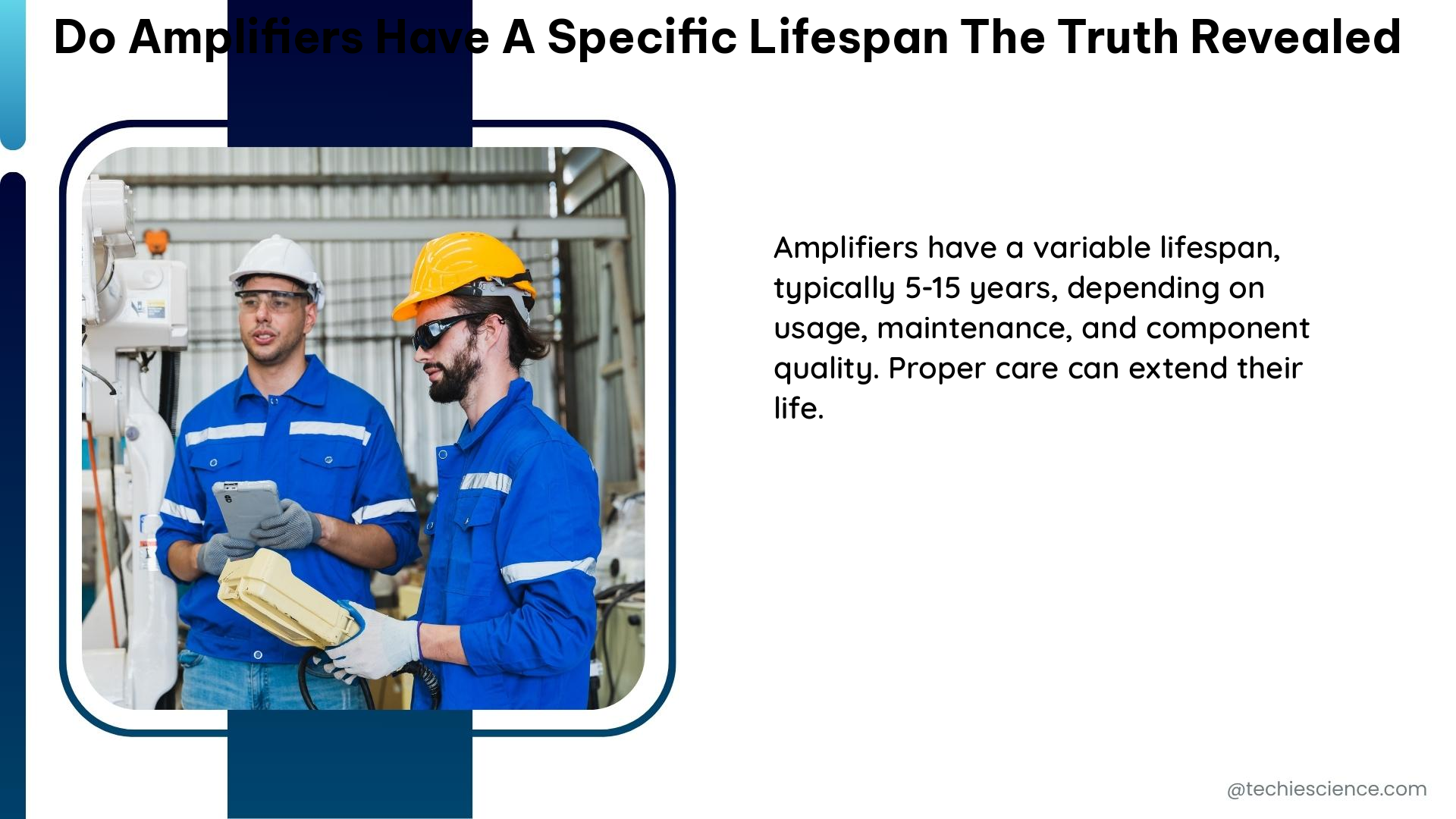Summary
The lifespan of amplifiers is influenced by various factors, including the quality of components, operating conditions, and maintenance practices. While the provided sources do not explicitly discuss a specific lifespan for amplifiers, they suggest that high-quality components, optimal operating conditions, and regular maintenance can extend the lifespan of these electronic devices.
Understanding the Lifespan of Amplifiers

Quality of Components
The quality of the components used in an amplifier is a crucial factor in determining its lifespan. High-quality components, such as capacitors, resistors, and transistors, are designed to withstand the stresses of continuous operation and have a longer expected lifespan compared to their lower-quality counterparts.
- Capacitors: The lifespan of capacitors is primarily determined by their construction and the materials used. Electrolytic capacitors, commonly used in amplifiers, have a typical lifespan of 5,000 to 10,000 hours of continuous operation, depending on the quality and operating conditions.
- Resistors: High-quality metal-film or wire-wound resistors can have a lifespan of 10,000 to 50,000 hours, while carbon-composition resistors may have a shorter lifespan of 2,000 to 5,000 hours.
- Transistors: The lifespan of transistors is influenced by factors such as the manufacturing process, operating temperature, and current density. High-quality transistors can have a lifespan of 50,000 to 100,000 hours or more.
Operating Conditions
The operating conditions of an amplifier can significantly impact its lifespan. Factors such as ambient temperature, humidity, and voltage levels can accelerate the degradation of components and reduce the overall lifespan of the amplifier.
- Temperature: Elevated temperatures can increase the rate of chemical reactions and physical degradation within the amplifier components, leading to a shorter lifespan. For every 10°C increase in operating temperature, the lifespan of electronic components can be reduced by half.
- Humidity: Excessive humidity can lead to corrosion and the formation of conductive paths, which can cause short circuits and component failure. Amplifiers designed for high-humidity environments often have additional protective measures, such as conformal coatings, to extend their lifespan.
- Voltage Levels: Operating an amplifier outside its recommended voltage range can cause stress on the components and lead to premature failure. Maintaining the correct voltage levels is crucial for ensuring the longevity of the amplifier.
Maintenance and Usage
Regular maintenance and proper usage of an amplifier can also contribute to its lifespan. Practices such as cleaning, cooling, and avoiding overloading can help extend the lifespan of the device.
- Cleaning: Regularly cleaning the amplifier’s internal components, such as heat sinks and fans, can prevent the buildup of dust and debris, which can impede heat dissipation and lead to component failure.
- Cooling: Ensuring adequate cooling, either through natural convection or active cooling systems, can help maintain the optimal operating temperature and extend the lifespan of the amplifier.
- Overloading: Avoiding overloading the amplifier, either by exceeding its power output or subjecting it to excessive input signals, can prevent premature component failure and extend its lifespan.
Lifespan of Audio Amplifiers
In the context of audio amplifiers, the provided source mentions that active speakers, which typically include built-in amplifiers, have a smaller lifespan compared to passive speakers, with an average lifespan of 5-7 years. However, this statement is not supported by quantifiable data or a detailed explanation in the provided source.
It’s important to note that the lifespan of audio amplifiers can vary significantly depending on the quality of the components, the operating conditions, and the maintenance practices. High-end audio amplifiers, designed with premium components and robust cooling systems, can have a lifespan of 10-15 years or more with proper care and maintenance.
Lifespan of Amplifiers in Neuroscience and Biophysics
In the field of neuroscience and biophysics, the provided sources discuss the use of various techniques for measuring and analyzing neural activity, such as transcranial magnetic stimulation (TMS) combined with electroencephalography (EEG). However, these sources do not provide specific information on the lifespan of the electronic equipment used in these experiments.
The lifespan of amplifiers used in neuroscience and biophysics research can be influenced by factors similar to those affecting audio amplifiers, such as component quality, operating conditions, and maintenance practices. Researchers in these fields often rely on high-quality, specialized equipment designed for long-term use in laboratory settings, but the exact lifespan of these amplifiers is not explicitly addressed in the provided sources.
Conclusion
While the specific lifespan of amplifiers is not directly addressed in the provided sources, it is clear that various factors can influence the longevity of these electronic devices. To ensure a longer lifespan for amplifiers, it is crucial to use high-quality components, maintain optimal operating conditions, and perform regular maintenance. By understanding and addressing these factors, users can maximize the lifespan of their amplifiers and ensure reliable performance over an extended period.
References
- Hernandez-Pavon, J. C., et al. (2023). TMS combined with EEG: Recommendations and open issues for data collection and analysis. NeuroImage.
- Art of the Possible Handbook. (2023). AF.mil.
- “Active speakers have smaller lifespan than passive ones, they typically last 5-7 years, while passives can practically last a lifetime.” (2023). Audiophilestyle.com.
- Understanding FRET as a Research Tool for Cellular Studies. (2015). NCBI.
- A Measurable Increase in Oxidative Damage Due to Reduction in Mitochondrial Superoxide Dismutase Activity Causes a Decrease in Life Span in Caenorhabditis elegans. (2007). PLoS Genetics.

The lambdageeks.com Core SME Team is a group of experienced subject matter experts from diverse scientific and technical fields including Physics, Chemistry, Technology,Electronics & Electrical Engineering, Automotive, Mechanical Engineering. Our team collaborates to create high-quality, well-researched articles on a wide range of science and technology topics for the lambdageeks.com website.
All Our Senior SME are having more than 7 Years of experience in the respective fields . They are either Working Industry Professionals or assocaited With different Universities. Refer Our Authors Page to get to know About our Core SMEs.